Music at RIT


Music
at RIT
Breadcrumb
- RIT/
- Performing Arts/
- Music/
- Music at RIT
Better Living Through Music
For majors and non-majors alike, there are countless ways to study and enjoy music. At RIT, you’ll have the opportunity to pursue whatever ways interest you the most. Study subjects like music theory, composing for video games, or music history. Declare a music and technology minor to learn about audio engineering. Join an RIT ensemble where you can practice and perform for the campus community. Or, customize your education to align with your interests by combining subjects.
Whatever you decide, you’ll have access to world-class faculty and instructors who share your passion for music and will help you grow in your skills and knowledge of the craft.
Music Minors and Immersions
As part of their bachelor’s degree requirements, RIT students must complete an immersion—a concentration of three courses in a particular area. Undergraduate students also have the option of completing a minor, which can complement their major or enable them to pursue an area of personal interest.
Music Performance Minor
Music and Technology Minor
Music Immersion
“It’s a way for me to escape stress.”
Chenyang Lin A computer science major from Pittsfield, Mass., has been playing the violin since he was 8 years old. He enjoys playing in the RIT Orchestra and RIT Chamber Orchestra.
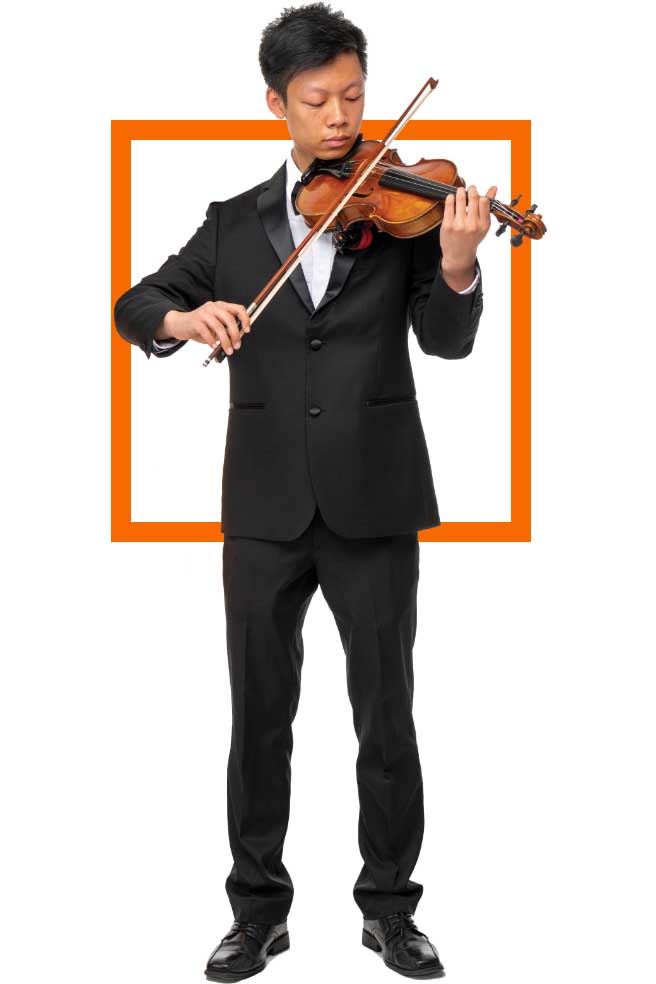
Chenyang Lin A computer science major from Pittsfield, Mass., has been playing the violin since he was 8 years old. He enjoys playing in the RIT Orchestra and RIT Chamber Orchestra.
“I like being able to just make something without any prep work and not having to find a place to put it afterwards. It’s spontaneous and you’re completely in the moment.”
Cassie Volkin A film and animation major from Madison, Ala., plays saxophone in the RIT Pep Band and may join the concert band and take private lessons.
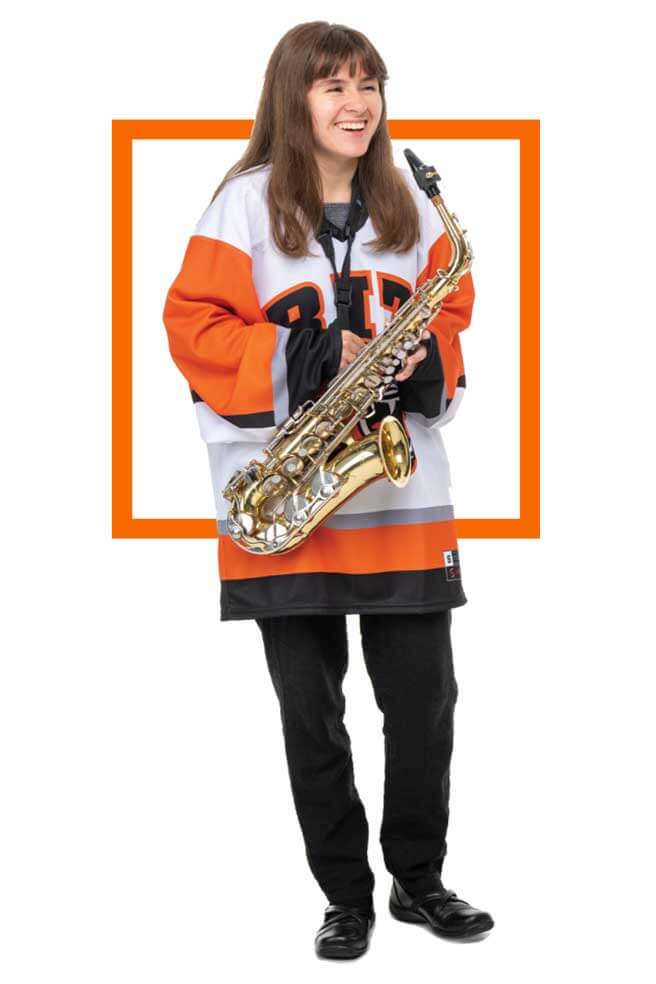
Cassie Volkin A film and animation major from Madison, Ala., plays saxophone in the RIT Pep Band and may join the concert band and take private lessons.
“The RIT scholarship honestly was a big factor,” he said about coming to RIT. “It not only allows me to continue my music, but encourages me to do it.”
Josh Gudesblat A percussionist from Downingtown, Pa., is studying mechanical engineering and is in the RIT Pep Band and RIT Philharmonic Orchestra.
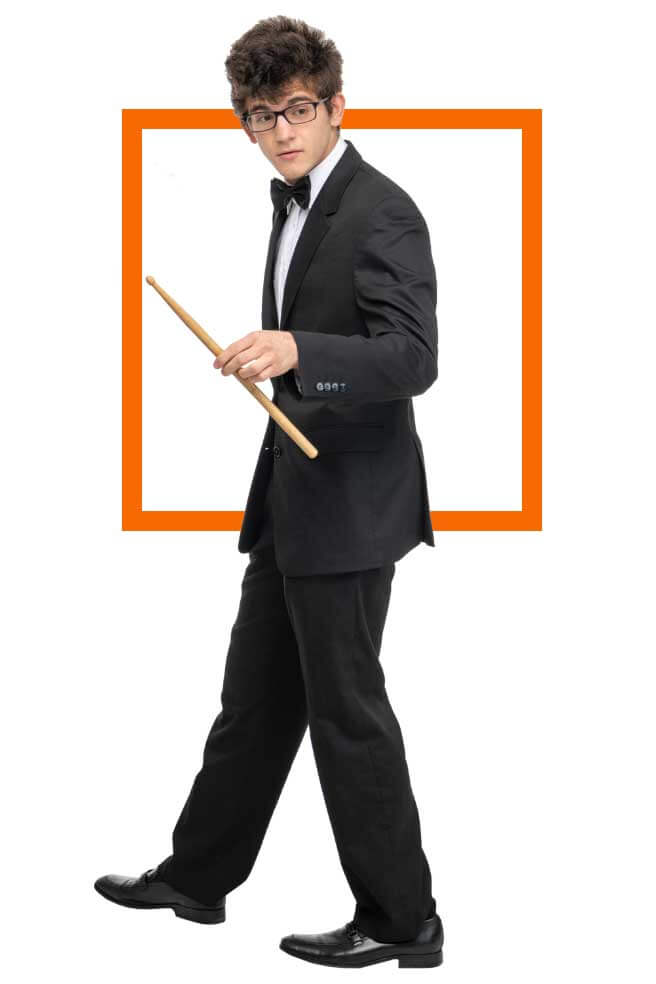
Josh Gudesblat A percussionist from Downingtown, Pa., is studying mechanical engineering and is in the RIT Pep Band and RIT Philharmonic Orchestra.
“Music for me is a way of connecting, not just with myself, but with all these amazing people. Whenever I am feeling anything, I pick up my guitar and strum away my feelings.”
Shubhang Mehrotra A computing engineering major from Bareilly, India, has been singing on stage for nearly 13 years and has been playing guitar for about five years.
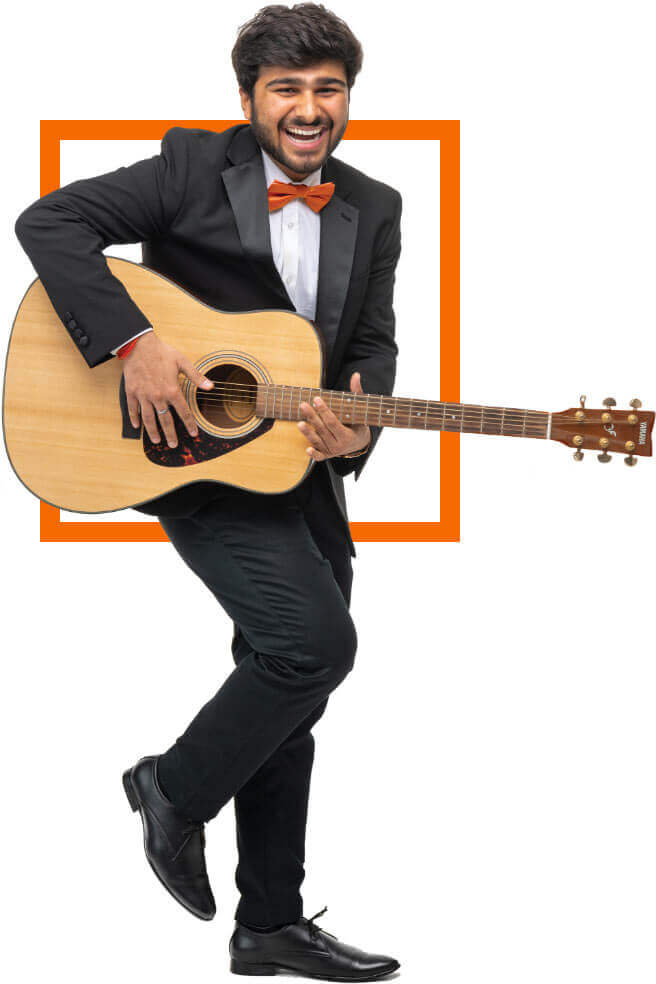
Shubhang Mehrotra A computing engineering major from Bareilly, India, has been singing on stage for nearly 13 years and has been playing guitar for about five years.
“I just feel that I can’t stop doing it. I just love sharing my talents and creativity with people.”
Quincy Myles Jr. A computing exploration major from Cheektowaga, N.Y., began playing the trumpet in sixth grade. He also enjoyed musical theater in high school. He is in the RIT Jazz Ensemble, RIT Singers, and RIT Players.
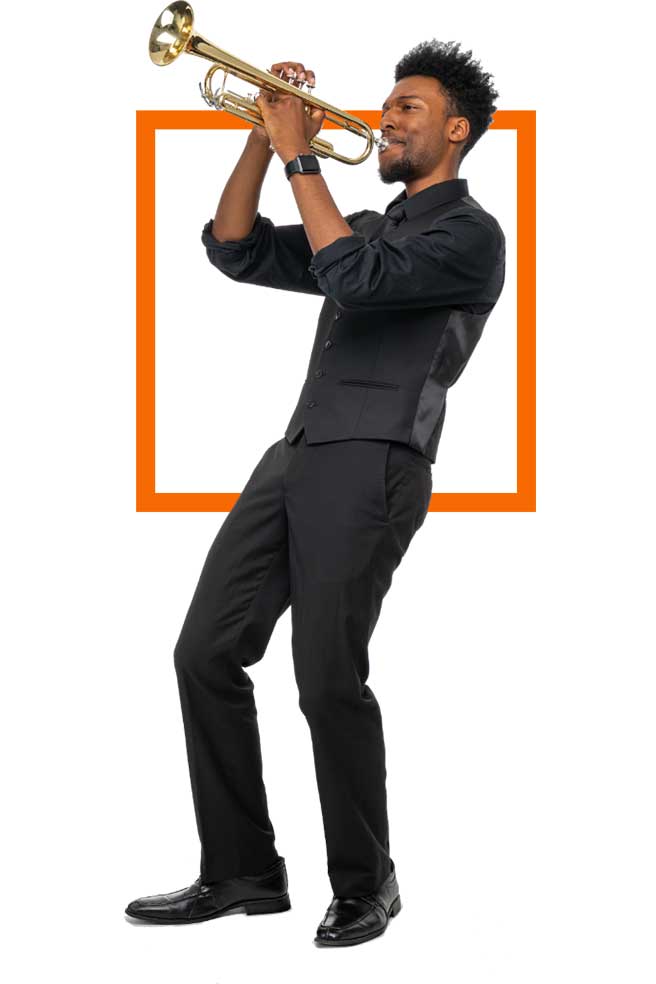
Quincy Myles Jr. A computing exploration major from Cheektowaga, N.Y., began playing the trumpet in sixth grade. He also enjoyed musical theater in high school. He is in the RIT Jazz Ensemble, RIT Singers, and RIT Players.
Private Lessons
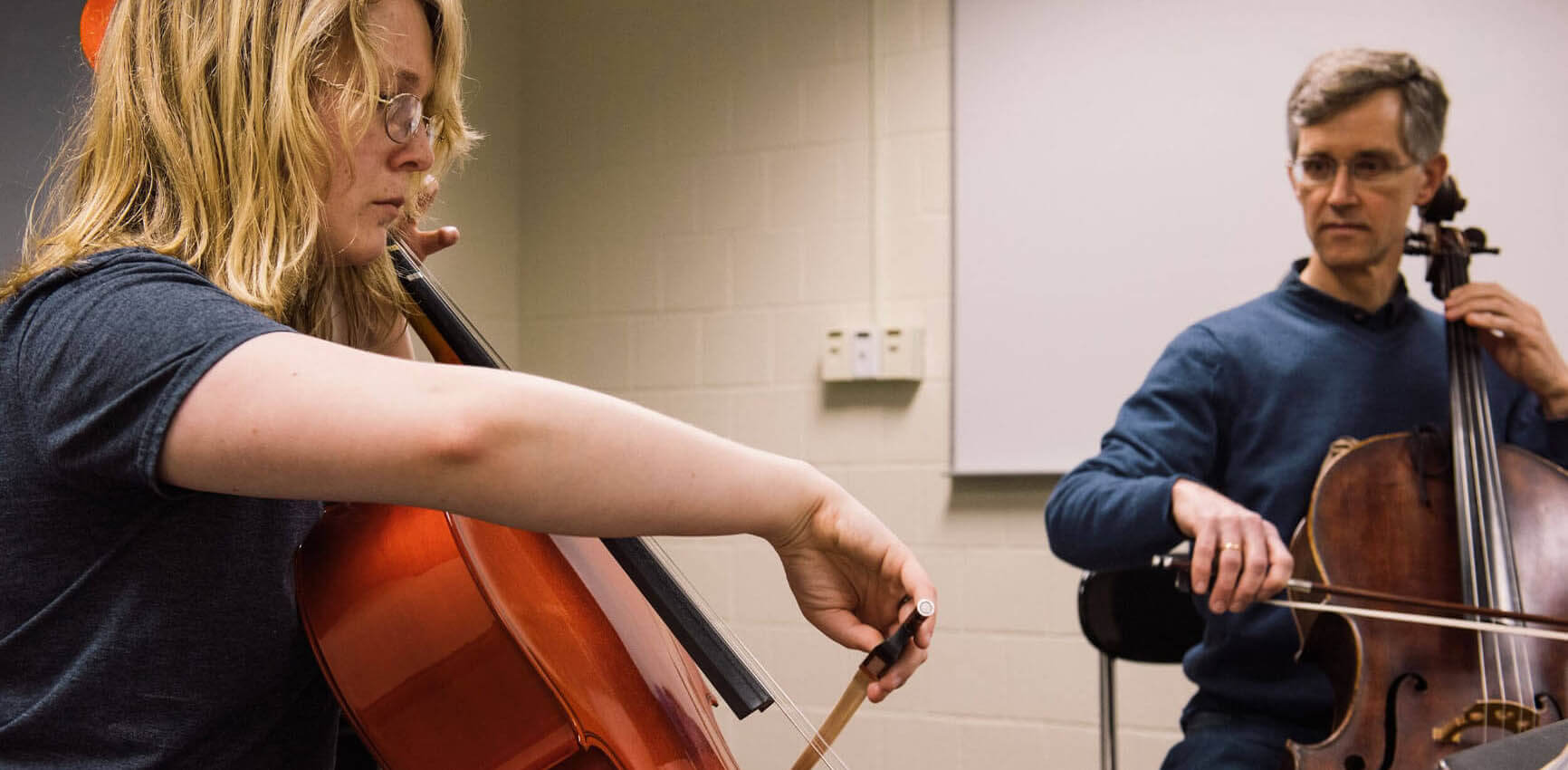
Students can receive private, one-on-one instrumental or voice lessons and participate in studio performance opportunities. Please note that most lessons are offered to support students participating in approved RIT music ensembles and therefore priority is given to ensemble members on a first come, first served basis. However, guitar and piano lessons are open to all RIT students. Interested students should contact performingarts@rit.edu with any questions regarding private music instruction. Please note: A $200 per semester course fee for private lessons will be implemented starting fall 2022.
RIT offers private music instruction for the following instruments:
- Piano (private or group)
- Guitar (private or group)
- Strings (violin/viola)
- Cello
- Clarinet
- Percussion
- Voice (private or group)
- Flute
- Saxophone
- Brass
Please note: A $200 per semester course fee for private lessons will be implemented starting fall 2022. For questions or inquiries, contact performingarts@rit.edu
Applied Music Instructors
Instructor Name: Ben Jorge
Email: bxjspa@rit.edu
Biography: Bernabe (Ben) Jorge, III, is currently a first year DMA candidate at the Eastman School of Music studying trombone performance and literature with Mark Kellogg. He holds Bachelor’s and Master’s degrees in music education from the University of Oklahoma in Norman, Oklahoma where he studied trombone with the acclaimed Dr. Irvin Wagner. Though primarily a bass trombonist, he is also versed in most low brass instruments. He plays a variety of musical styles and has experience performing in orchestras, wind ensembles, brass bands, and chamber groups.
As a music educator, Ben taught elementary music at Jackson Elementary School in Norman, Oklahoma. At the same time, he maintained a healthy trombone studio and gained a great amount of teaching experience through these opportunities. Ben’s hope is to teach as many students as possible how to love music, have fun with music, and use the power of music in all situations.
Instructor Name: Joan Kinsella
Email: jmkgla@rit.edu
Biography: Cellist Joan Kinsella has established a reputation as both a teacher and a performer. Dedicated to a performing career focusing on a variety of genres, Ms. Kinsella appears regularly as a chamber musician and orchestral player in upstate New York. Recent performances include Eastman at Washington Square Series, Eastman Presents Series, WXXI’s “Live from Hochstein” broadcast, SUNY Brockport Fine Art Series, Eastman Women in Music Festival, and shows with artists including Seal, Idina Menzel, Josh Groban, and Michael Bublé. She has performed with the national tours of numerous Broadway productions, including Fun Home, Newsies, Pippin, Kinky Boots, Lion King, Phantom of the Opera, and West Side Story. She routinely performs with the Rochester Philharmonic Orchestra, the Rochester Oratorio Society Orchestra, and Geva Theatre Center. Ms. Kinsella has been a member of the Syracuse Symphony Orchestra, the Syracuse Camerata Chamber Orchestra, Gibbs and Main, and ensemble.twenty.21.
As an educator, Ms. Kinsella is passionate about teaching cello and chamber music as well as exploring repertoire from a variety of time periods and styles. She is dedicated to a holistic approach for learning where comfort, body awareness, and mindfulness are integral parts of the physicality of playing a string instrument. Ms. Kinsella focuses on providing tactical systems for improving cello technique and analytical skills for evaluating performance. By developing an ability to conceptualize desired sound, texture, and style, students value these aspects in their playing and recognize the qualities needed for enhancing musical and artistic interpretation.
Instructor: Marcy Bacon
Email: mdbgla@rit.edu
Biography: Clarinetist Marcy D. Bacon jteaches applied clarinet, clarinet techniques, and performs with the Wilmot Wind Quintet at Nazareth College. She is the clarinetist for modern chamber music group fivebyfive, which was recently featured on the cover of City Newspaper and through performances at the Rochester Fringe Festival (2017, 2018 and 2019), WXXI’s Backstage Pass (2018) and WXXI’s Live from Hochstein. She is a member of Fem Vindar [a woodwind quintet], and has played in a number of local and regional orchestras including the Western New York Chamber Orchestra and Rochester Oratorio Society Orchestra. As a member of the flute/clarinet duo VocaSynth, she premiered Cylindrical Sea by Russell Scarbrough at the 2012 National Flute Association Convention in Las Vegas, NV.
Marcy earned a Doctor of Musical Arts degree in Performance and Literature from the Eastman School of Music in 2008 and holds a Master of Music degree from Michigan State University, as well as a Bachelor of Music degree from Portland State University in Portland, Oregon. Principal teachers include Kenneth Grant, Elsa Ludewig-Verdehr and Stan Stanford. Dr. Bacon holds Early Childhood and General Music Level I Certifications from the Gordon Institute for Music Learning (GIML) and has served as the historian for GIML National. Additionally, Marcy is a founding member of the New York State Chapter of GIML (NY-GIML).
Dr. Bacon has presented sessions on wind quintet literature with her Wilmot Wind Quintet colleagues at the New York State School Music Association (NYSSMA) Winter Conference and the NAfME All-Eastern Conference. She has also presented sessions on the topic of audiation as it pertains to both early childhood and instrumental applications at the NYSSMA Winter and Summer conferences. Prior to joining the faculty at Nazareth, Marcy taught applied clarinet and clarinet methods at SUNY Fredonia for seven years. She has taught lessons with the Hochstein School and the Community Music School of the Battle Creek Symphony Orchestra, and general music in the Jamestown City School District and for the Diocese of Rochester. Marcy can be heard on the Oregon Catholic Press label playing sacred music and compositions by Jacob Avshalomov. She lives in Chili, NY where she maintains a private studio.
Instructor: Yuting Liu
Email: ytlspa@rit.edu
Biography: Flautist Yuting Liu is an active musician who performs extensively as a recitalist and chamber musician, giving concerts in many countries, such as China, United States, Canada, Austria, Germany, France, and Australia.
Born in Beijing, China. Yuting began flute studies at the age of 8. Her teachers included Xiaohua Cheng, the co-principal flutist of the China Philharmonic Orchestra and Nikola Todor Atanasov, principal flautist with the Beijing Symphony Orchestra. Her awards in China included winning the First Prizes in Beijing Art Festival solo competitions in 2000, 2001, 2003, and 2004. After moving to the United States, she earned her Bachelor degree at Depauw University, where she studied with Anne Reynolds, winning the Scholarship Music Performance President Award for Excellence and the DePauw University Concerto Competition. Also, Yuting holds two Master degrees. She completed her first Master degree at Indiana University, studying with Thomas Robertello, where she won the Indiana University Jacobs School of Music Artistic Excellence Award. She received the second master degree with French flutist Jean Ferrandis at California State University, Fullerton, where she won the School of Music Scholarship and worked as a teaching assistant in CSUF. Yuting earned Advanced Performance diploma at Eastman School of Music with Merit Scholarship, and work as a teaching assistant.
Yuting was the winner of The 8th Hong Kong International Music Festival Competition and the finalist of the San Diego Flute Guild Young Artist Competition. Her Flute Princess & Animation album won the 16th Top Ten Audiophile Records Award: The Best Instrumental Album of the Year and The Best Art Award held by Guangdong, China Musicians’ Association.
Yuting was the principal flutist in Rio Hondo Symphony Orchestra in Southern California, as well as in the Grand Forks Symphony Orchestra, North Dakota. Recently, she is the cooperative artist of Revival Arts and Media Ltd. Vancouver Canada; and Global Outstanding Chinese Artists Association, San Francisco, United States.
She has presented recitals, performed chamber music, and appeared as soloist with orchestras in such prestigious concert halls as Carnegie Hall, Esterházy Palace, Forbidden City Concert Hall, Chateau of Chantilly, Chartres Cathedral, Mozarteum University Salzburg, China Century Monument Hall, Nanshan Cultural Center Theater Recital Hall, and many others.
Yuting has recorded two of her music albums with Rhymoi Music Record Company: Somewhere in Time released in April 2019; Flute Princess & Animation released in June 2020.
Recently, Yuting has been pursuing Doctorate degree at Eastman School of Music, Rochester. She also holds faculty position teaching at Eastman Community Music School, and secondary teaching at University of Rochester.
Instructor: Matias Homar
Email: mxhspa@rit.edu
Biography: Born in Salta - Argentina, Matias Homar began his electric guitar studies at the age of 14 and thus began his journey through music. He completed his doctorate in composition at the University of Buffalo (USA) after completing his degree and teaching in music with a composition orientation at the Faculty of Arts of La Plata (Buenos Aires) while continuing to take private lessons in guitar and composition with different teachers such as Néstor Gómez, Marcelo Katz, Marcelo Penovi, Peter Bernstein, Brad Shepik, Beto Caletti. Some of the workshops in which he participated were given by Juan Quinteros, Tiki Cantero, Ernesto Snajer, Marcelo Moguilevsky, Lilián Saba, David Liebman, among others.
During the doctorate he began to develop GEP (experimental project with interactive devices). In this project, the focus is on developing sensor-based MIDI controllers that use body movements to generate and alter sound. So far he has developed a slipper and a portable module (oriented to ballerinas). An interactive glove is currently under development.
During his time at the Faculty of Arts, he also served as an assistant to the Tonal Musical Language chair, was part of the research team and worked as a recording technician in the studio of said house of studies.
Among his artistic activities stand out Imaymana Duo, Cosmo Ensemble, La Malagua Fosforescente, Chavesio Jazz, Cnidaria, in addition to participating in different contemporary music ensembles.
With Imaymana Dúo they released their first CD in 2017 and in 2021 they released their second album. They have made various presentations in different locations in Argentina through Salta, Jujuy, Tucumán, Santa Fé, Córdoba, Mar del Plata and La Plata. In addition to participating in some festivals such as the UNLP Biennial. His contemporary works have been performed at the ECI (La Plata), the Nordic Saxophone Festival (Denmark) and in Buffalo (USA). He has collaborated with contemporary dance groups: Quarzo (Salta) and I Have a Baby Whose Name is No One (Buffalo). She currently collaborates with Nancy Hughes in Buffalo on an Improv and Contact basis.
In the academic field, she presented works in different congresses such as FLADEM (CABA), Músicos en Congreso (Santa Fé), Popular Music Congress (Villa María), IASPM-LA (Cuba), CALACS (Canada) and Calgary. With his work on the music of Gustavo 'Cuchi' Leguizamón, he has given talks at the universities of Georgia and Miami (USA) and at the Superior Conservatory of Music (Spain). His teaching career, in addition to his work at the university level, includes a journey through the different levels of primary and secondary education in the province of Buenos Aires. Having also taught different courses and workshops on Musical Language and Composition and Arrangement.
Instructor: Susan Rebeca Boyd
Email: srbspa@rit.edu
Biography: Dr. Rebeca Boyd earned her Doctorate of Musical Arts from the Eastman School of Music as a student of the legendary pedagogue Professor Zvi Zeitlin. Music Education and community outreach have been at the forefront of Dr. Boyd’s artistic development. For over two decades Dr. Boyd has been an instructor of violin and viola at Eastman Community Music School, where she developed innovative string curricula, and provided community outreach through their Pathways Program. Her students have gone on to pursue music in their higher education. As a faculty of the Rochester City School District, Dr. Boyd is bringing her unique expertise into the public schools, providing quality instruction and passing on artistic leadership skills to the students under her guidance.
As an experienced performer Dr. Boyd has participated in artistically diverse projects which merge technology, music, and film. As a member of the Empire Film and Music Ensemble (EFAME), she has been a featured soloist for film scores for the Beal Institute Recording Sessions, and a guest soloist in the Rochester Fringe Festival. She was also a frequent performer at the Women in Music Festival which highlights women composers. She was the Concertmaster of the Weber State Symphony Orchestra in Utah, and has recently served as Concertmaster of the Genesee Valley Orchestra and Chorus.
Dr. Boyd has received outstanding honors in International Competitions and performed at several international music festivals, winning second prize in the Master Player’s International Music Competition (Italy) 2011. In the same year Dr. Boyd made her debut at Weill Recital Hall at Carnegie Hall in New York City as a winner of the Romantic Music Competition of the American Protégé International Competition.
Instructor Name: Jiaqi Yu
Email: jxyspa@rit.edu
Biography: Coming from a non-musician family, Jiaqi Yu’s talent was recognized early, and encouraged to follow her passion for the violin. Yu started studying with a violin pedagogue Prof. Xiaoshao Huang when she entered the elementary school of Central Conservatory. At age 19, Ms. Yu earned a full scholarship to Oberlin College and Conservatory to study with Milan Vitek. She has also studied with Grammy-award-winning violinist Sibbi Bernhardsson after Milan Vitek retired from Oberlin.
Jiaqi Yu as a passionate soloist and collaborator worked closely with top institutions, such as Central Conservatory in Beijing, Oberlin College and Conservatory, Eastman School of Music, and Cincinnati Conservatory of Music. She also worked with world-class musicians and well-known string quartets, such as Milan Vitek, Sibbi Berhardsson, Kirsten Doctor, Marylin McDonald, Merry Packham, Masumi per Tostad, Verona Quartet, Brentano String Quartet, Doric String Quartet, Tokyo String Quartet, and Ying Quartet.
Ms. Yu has performed as concertmaster and principal player for some of the top institutions in the world, including Eastman Musica Nova, Oberlin Conservatory Chamber Orchestra, Oberlin Orchestra, and Oberlin Contemporary Music Ensemble, NYO- China Orchestra, and China Youth Orchestra. Yu traveled with the orchestra worldwide, including Mainland China, Hongkong, Macau, Taiwan, South Korea, the Czech Republic, and the United States. Yu has also played a lead role as a principal musician in distinguished productions, including concertmaster of the world premiere of Dance Mobile by 2000 Ernst von Siemens Music Prize-winner Augusta Read Thomas during the Eastman School of Music Centennial celebration.
Jiaqi Yu is pursuing a Master of Music degree at the Eastman School of Music in Rochester, NY, with Professor Yoo Jin Jang, the Sendai Internation Music Competition winner, in 2016. This August, Yu won the 3rd prize in the Young Soloist International Music Competition.
Instructor: Ted Canning
Email: eacwell@rit.edu
Biography: Percussionist and Teaching Artist Ted Canning has done extensive freelance work in the northeast United States. His work includes performing classical music, theater, big band and jazz. Performances on stage, in workshops and residencies at schools, colleges and community settings happen throughout Western New York and Pennsylvania.
Ted uses music to teach fundamental curriculum skills such as math, language skills, social studies, history and science, illuminating concepts to students and opening doors to other styles of learning. He has performed with national champions “Phase II Pan Groove” in Trinidad and Tobago, as well as in Europe, in Latin America and with numerous steelbands in Brooklyn, New York. Ted now leads the Panloco Steelband , the “Steel Alchemy” Community Steelband and the RIT (Rochester Institute of Technology) Steel Band. He performs with the Trinidad and Tobago Steelband, and has performed with “pan” players from Trinidad and around the world.
Instructor Name: E-Na Song
Email: ensspa@rit.edu
Biography: Korean-born pianist, Dr. E-Na Song is a concert pianist, collaborative pianist, and educator. As an active performer, Dr. Song has performed throughout the United States, Poland, Spain, Austria, and Korea. Recently she has appeared in venues such as Weill Recital Hall (Carnegie Hall), Kodak Hall at Eastman Theatre, and Hochstein School. When she is not performing or teaching, Dr. Song works as the Assistant Director of the Rebecca Penneys Piano Festival (RPPF).
Dr. Song loves presenting a variety of music and styles to audiences. She recently performed for Live from Hochstein Concert Series, “Celebration of Dance,” broadcast on WXXI Classical 91.5 FM, featuring dance-inspired music by Beethoven, Kodály, Liszt, and Albright. As an active collaborative pianist, she performed in a Soprano Concert, “Returning Home,” in the Weill Recital Hall with music by Schubert, Schumann, Wolf, Debussy, Sibelius, Cipullo, and Won-Ju Lee, as well as Korean folk songs. She recently gave a concert, “Teacher, Student, and a Virtuoso,” including music by Leek and Franck, with her violinist colleague at Nazareth College in Rochester, NY.
Currently, Dr. Song is a piano faculty at Roberts Wesleyan University, the Hochstein School, and Roberts Community Music School. She concurrently holds a collaborative pianist position at SUNY Geneseo and Eastman Community Music School.
Dr. Song earned her Bachelor’s Degree from Seoul National University, which is the most prestigious university in South Korea, under Professor HyungBae Kim. She completed both her Master’s and Doctorate of Music in Piano Performance and Literature at the Eastman School of Music under the tutelage of Professor Rebecca Penneys.
Instructor Name: Gina Hyunmin Lee
Email: hglspa@rit.edu
Biography: Gina Hyunmin Lee is a Korean-Canadian pianist, collaborator and educator. In the summer of 2023, Gina received a fellowship to attend the Aspen Music Festival as an instrumental collaborative pianist. As a recitalist, Gina has been invited to festivals and venues across North America, France and Austria including Songfest, Zodiac Music festival, Yarn/Wire Institute, international sommerakademie of the University of music and performing arts Vienna, Indian River Music Festival, Toronto Arts and Letters Club, Roy Thompson Hall and the Music Gallery (Toronto). During the 2022 – 2023 season, Gina’s chamber group (formed alongside three other Eastman graduate students) was invited as national finalists at the MTNA chamber music competition as well as the 10th annual Coltman Chamber Music competition.
In addition to performing, Gina is a devoted educator who is inspired by music’s collaborative and synergetic nature found in educational settings. Her master’s pedagogy research project focused on the relationship between blindness and development of tactile and aural senses at the piano, which was recognized with the Joseph-Armand Bombardier Scholarship, awarded by the Social Sciences and Humanities Research Council of Canada. This research project was presented at the 2020 national MTNA Conference in Chicago. Most recent teaching engagements include coaching undergraduate chamber music groups from the Arthur Satz Department of Music at the University of Rochester and teaching private lessons to local youth in Aspen region through the Aspen music festival’s P.A.L.S program.
Gina is grateful for her formative years spent as a student at the University of Toronto, where she completed her undergraduate and master’s degrees. There, her mentors were pedagogues Dr. Midori Koga and the late Professor Marietta Orlov. Her studies in Canada and abroad have been supported by numerous organizations, including the ArtsNB foundation, Art song foundation of Canada, and the Alice and Armen Matheson Scholarship from the University of Toronto. Currently, Gina is pursuing her doctoral studies at the Eastman School of Music with Dr. Andrew Harley, where she serves as a studio accompanying graduate assistant and departmental assistant.
Instructor Name: Colin Crake
Email: cncgla@rit.edu
Biography: A rising saxophone soloist and pedagogue based in Rochester, NY, Colin Crake is currently a graduate student at the Eastman School of Music, where he is pursuing a Doctoral of Musical Arts in Saxophone Performance and Literature under the tutelage of Prof. Chien-Kwan Lin. He is also currently a candidate for Eastman’s prestigious Artist Certificate, the first saxophonist candidate in the school’s history. He is a recent graduate of the Conservatoire royale de Bruxelles in Brussels, Belgium where he studied with French saxophonist and composer Vincent David. He received his Masters in Music degree and was awarded “Grande Distinction” for his work with David and for his thesis, titled Le guide pratique de saxophonist sur l’interprétation de Dialogue de l’ombre double (1985) de Pierre Boulez. Before this, he received his Bachelor of Music in Saxophone Performance with High Distinction and a Performance Certificate at Eastman.
As a soloist, Colin is a multi-award winning saxophonist, having received prizes at the national and international level. His most notable accolades include the First Prize from the 2022 North American Saxophone Alliance Collegiate Solo Competition, the Third Prize from the 2021 Andorra SaxFest International Saxophone Competition, and the First Prize from the 2017 Vandoren Emerging Artist Competition. He has also had the honor of advancing the world’s most prestigious saxophone competitions, including the 2017 Jean-Marie Londeix International Saxophone Competition in Bangkok, Thailand, and the 2019 Adolphe Sax International Saxophone Competition in Dinant, Belgium. Colin regularly gives solo recitals at the Eastman School, as well as at international conferences, including the US Navy Band’s International Saxophone Symposium held in Washington, DC. He has performed as a soloist with the Eastman Wind Ensemble and the National Classical Orchestra of Andorra.
As a chamber musician, Colin has been a member of numerous saxophone quartets and other chamber groups. Most notable is his membership of the internationally-recognized Eastman Saxophone Project, where currently serves as the ensemble’s Assistant Director and Chief Arranger. Recent arrangements of his include a suite of Edvard Grieg’s Lyric Pieces, Gyorgy Ligeti’s Hungarian Rock, and Gioacchino Rossini’s Overture to La gazza ladra. He has also been called upon to serve in saxophone ensembles abroad, including the Belgian Saxophone Choir.
Instructor: Natalie Fuller
Email: nfsspa@rit.edu
Biography: Natalie Fuller began playing the piano at the tender age of 4, and trumpet followed 2 years later. Born and raised in Saskatchewan, Natalie’s 12 years of homeschooling allowed her the freedom to travel across Canada and the United States as well as internationally to Great Britain and Japan with award winning ensembles including the Regina Lions Band (Bob Mossing) and the South Saskatchewan Youth Orchestra (Alan Denike). A short six months after being diagnosed with cancer, Natalie went on to achieve the highest mark in Canada for the Associate of the Royal Conservatory of Toronto diploma in trumpet performance, under the tutelage of Sharie Argue.
At the University of Regina in Saskatchewan, Natalie studied under Dr. Ed Lewis (CBC Radio’s “Jazz Doctor”) and Miles Newman (principal of the Regina Symphony Orchestra). After completing the bachelor’s degree in just three years, Natalie was awarded the President’s Medal, the highest distinction upon graduation. Natalie then moved to Rochester, New York where she studied with the renowned James Thompson at the Eastman School of Music for both a masters and doctoral degree. During her time there, Natalie won 1st place in the brass division of the Canadian Music Festival and placed in the top three at the American National Trumpet Competition several times.
Natalie has performed for a wide variety of audiences, including notable trumpet greats like Stephen Burns, Tom Stevens, John Wallace and Mark Gould to dignitaries including the Governor General of Canada and even Prince Charles. Whether in an ensemble or performing solo with her sister Maria Fuller (an accomplished pianist with a Masters degree in piano performance from the University of Cincinnati College-Conservatory of Music), Natalie loves to play her trumpet. The Fuller Sisters’ repertoire includes a wide range of styles and eras, but Natalie specifically enjoys researching and presenting music that is relatively unknown and off the well beaten trumpet path. Natalie and Maria are currently working on a recording project that would include several of these pieces. in 2015 Natalie won the second trumpet/assistant principal trumpet chair with the Regina Symphony Orchestra and continues to play with them for their Masterworks Series.
Teaching is equally important to Natalie and she maintains an active studio of talented trumpeters. Young or old, beginner or advanced, Natalie is devoted to her students and relishes in their accomplishments. Recently, Natalie has taught at the University of Rochester, Eastman Community Music School and Cornell University. After completing a one year contract as head of brass at Montana State University Natalie returned to Saskatchewan where she taught privately and for the University of Regina. In the spring of 2016 Natalie married the love of her life and transitioned back to Western New York where she is currently teaching brass and theory at the College at Brockport (State University of New York) and Hobart and William Smith Colleges.
Instructor Name: Amy Cochrane
Email: axcgsh@rit.edu
Biography: Amy Cochrane has established herself as an important singer in the worlds of opera, light opera and oratorio. Her lyric coloratura roles have included Violetta, Nanetta, Lucia, Gilda, Gretel, Adina, Mabel, Johanna, Constanza and Blondchen in regional companies across our nation such as Madison Opera, Cincinnati Opera, Opera Idaho, Roanoke Opera, Oswego Opera, Light Opera Works of Chicago, Washington Concert Opera, Lake George Opera, Opera Company of Boston, Sarasota Opera. She received her undergraduate degree in voice from Oberlin College and her graduate degree in Voice from The New England Conservatory of Music. Ms. Cochrane’s Carnegie Hall performances include soloist for Haydn's Creation twice with John Rutter and the New York premiere of The World of the Spirit, by Benjamin Britten. While in Chicago, Ms. Cochrane soloed frequently with Chicago's Music of the Baroque in works by Cavalli, Monteverdi, Telemann, Mozart, Bach, Purcell, Handel, Schubert and Bach.
Instructor: Gino Pinzone
Email: gppspa@rit.edu
Biography: Gino Pinzone is a classically-trained baritone from Buffalo, New York. Currently, Gino is a Doctoral candidate studying voice at the Eastman School of Music, in the studio of Dr. Jonathan Retzlaff. He has sung leading roles with the Salzburg Festspielhaus, Canadian Opera Company, Cincinnati Opera and San Francisco Opera. He is a graduate of the Crane School of Music at SUNY Potsdam and received his Masters Degree in Voice from the Cincinnati College-Conservatory of Music. He has had a private studio since 2012 and former students have performed on Broadway, national tours and various professional opera companies.
Ensembles
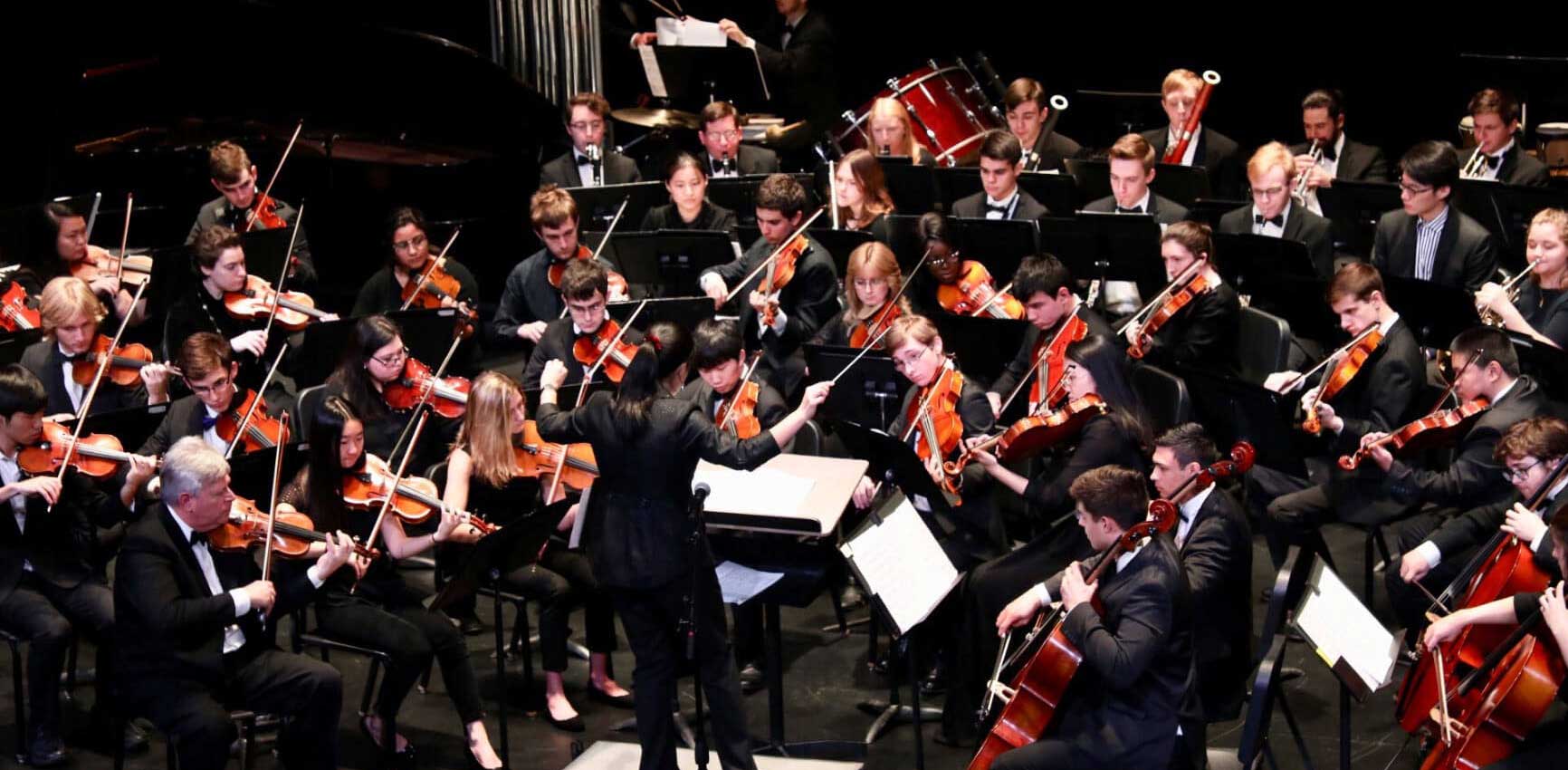
RIT is proud to be home to several music ensembles, some of which offer academic credit: Orchestra, Concert Band, Jazz Ensemble, RIT Singers, and the West African Percussion Ensemble, as well as the Steelband Ensemble, Gospel Ensemble, and Guitar Ensemble, that are non-credit bearing.
Auditions for each ensemble are typically held at the beginning of each semester. For audition details, as well as other information, please click on any ensembles of interest below.
Popular Music Collective
The RIT Popular Music Collective provides collaborative opportunities for musicians, producers, recording engineers, artist managers, promoters, graphic designers, music journalists, marketing teams, and arts entrepreneurs to work together to promote music on campus. Students have access to rehearsal space in the Annex, live sound and lighting equipment training, bi-weekly songwriting workshops and weekly jam sessions. Whether your aspirations are as an artist or as a part of the team that drives the entertainment industry, there are many opportunities to participate!
Music Rooms
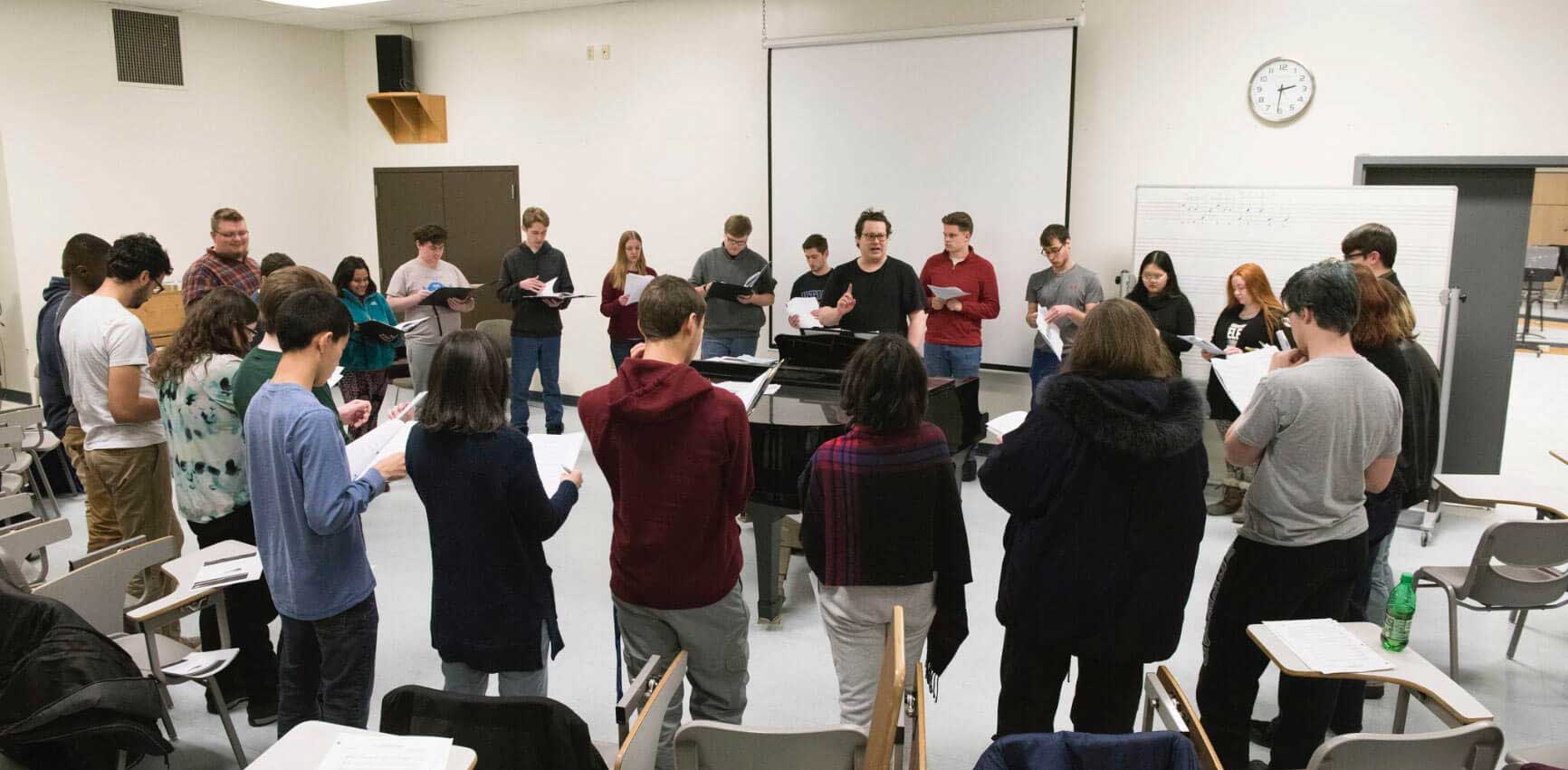
The RIT Music Program has several designated music practice/rehearsal rooms on campus, with most located on the A-levels of Liberal Arts Hall and the Student Alumni Union. Applied Music lessons are conducted in the music rooms in Liberal Arts Hall (A260, A264, or A269) and in Annexes 907/908, while all faculty-led performance ensembles rehearse in the SAU (A120 and A130). RIT students, faculty, or staff who wish to inquire about the availability of any music rooms on campus, please contact Michael Dwyer. Students participating in a curricular music ensemble or Applied Music studio seeking individual practice space can utilize the practice rooms within SAU A139.
College of Liberal Arts, School of Performing Arts
Music Practice Room Policy (effective as of August 2022)
Practice room policy for music rooms SAU A140, A141, A142, A143, A135 (reserved for percussionists only), as well as LBR A260, A264, and A269.
Use of SAU and LBR music practice/rehearsal rooms is for students who are currently enrolled in a credit bearing music or theatre arts course. Access to reservation system will be granted automatically by your instructor. No outside groups or individuals allowed, unless by special request, which must be approved by Director of School of Performing Arts. Faculty and staff requests for use of music rooms should be sent to Michael Dwyer, Assistant Manager of Operations and Events, at madspa@rit.edu. Music practice room reservations may be requested once all faculty studio and classroom courses have been scheduled for the semester.
Once all academic needs have been fulfilled for the semester, priority will be given to students in the following order:
- Performing Arts Scholars enrolled in Applied Music lessons, and Applied Music piano students.
- Students enrolled in Applied Music lessons who are non-performing arts scholars.
- Students participating in faculty-led ensembles (Concert Band, Philharmonic Orchestra, Jazz Ensembles, RIT Singers, etc.) and approved Performing Arts Scholarship groups (string quartet, brass quintet, woodwind quintet etc.).
- Performing Arts Scholars not participating in 1, 2 or 3 above. Performing Arts scholars who wish to make an advance reservation for a practice/rehearsal room, must submit a request to their Performing Arts Scholarship coach and it will be reviewed by the Performing Arts Program. You may expect a response within 48 hours.
Scheduling & Room Access
- All reservations are for one hour unless no student is waiting outside to use the room. Requests exceeding one hour will be denied and you will need to resubmit your request. Setup and tear-down times are built into your reservation.
- If a practice room is empty for more than 10 minutes, it will be assumed available and the reservation forfeited. Students cannot hold their place in assigned or unassigned spaces with books, music, or other items.
- If your reservation is approved, you will be given card swipe access to the exact room you booked.
- You cannot access the room until your reservation time unless it is empty when you arrive.
- Room requests must be submitted 48 hours in advance. Requests made within 48 hours will be considered, but there is no guarantee.
- Weekend room requests must be submitted by 12:00 PM on Friday.
Cancellations & Rescheduling
- If you no longer need your reservation or need to reschedule, please cancel your existing reservation in EMS ASAP or contact Michael Dwyer (madspa@RIT.EDU; 585-475-5201).
Safety & Security
- Please review the RIT Safety Plan for the most recent guidelines and requirements for campus safety and security.
- Do NOT leave instruments unattended. RIT is not responsible for stolen or damaged items.
- NEVER leave doors propped open for your safety, that of your peers, and university equipment.
- Music rooms may not be used between 10:00 PM and 8:00 AM.
General Rules
- Neither food nor drink is allowed in any music room, except bottled water, without written permission from the School of Performing Arts.
- Rooms must be left neat and orderly; sometimes this means better than you found it. Stands and chairs should be on racks and garbage in the appropriate bins.
- Percussionists seeking to use the Percussion Storage Room (SAU A135) must first receive permission from their ensemble director or the instructor of Applied Percussion.
Students or groups who repeatedly violate the above policies may lose their room reservation privileges for the semester.
If you have any questions, you may contact Michael Dwyer, Assistant Manager of Operations & Events (madspa@RIT.EDU, 585-475-5201). Thank you for helping us keep our music rooms in good condition.
Please visit reserve.rit.edu to submit your reservation request.
RIT School of Performing Arts
Music Room Policies for Performing Arts Student Clubs
As of August 28, 2023
The following policies are for approved Performing Arts clubs on campus seeking rehearsal space in a music room managed by the RIT School of Performing Arts.
Student Clubs must meet the following criteria to use the music rooms:
Recognized as an official club by Center for Campus Life and approved as a performing arts-based club by the School of Performing Arts. To be considered as approved to utilize performing arts space, please email clubs@rit.edu.
Must be in good standing with Center for Campus Life, meaning clubs have no holds and are active/re-recognized.
Fees
- Performing Arts student clubs may now reserve the School of Performing Arts-managed rooms free of charge.
- However, if any damage, theft, or loss to/of facilities or equipment is discovered, the club may be charged a replacement and/or damage fee. The club may also be referred to the Office of Student Conduct and Conflict Resolution if necessary.
- If there is a need to replace damaged, lost, stolen, or misplaced equipment, fees will be assessed as appropriate. If there is a concern about the financial obligation, please contact Campus Life (clubs@rit.edu).
Scheduling & Room Access
- Requests will only be reviewed after academic space needs are met for the semester, and no sooner than the end of the first week of classes.
- Requests must be submitted at least 4 business days in advance via RIT Events. Clubs should select the “Request Performing Arts Space 22-23 Fall -StudOrg” template.
- Approved clubs are allotted up to two, one-hour reservations per week. Once a club has used their reservation quota per week, additional requests will be considered on a case-by-case basis.
- Reservations may be canceled without notice due to academic needs at least 48 hours in advance.
- Participant numbers may not exceed the capacity limits indicated in EMS other than SAU A130 which has a rehearsal capacity of 20. Clubs exceeding this number can make reservations for smaller subsets and the request will be considered.
- Up to two members from a club may receive card swipe access to the space upon confirmation of a reservation. The club members receiving card swipe access must be listed as the points-of-contact in the RIT Events system.
Cancellations & Rescheduling
- If you no longer need a reservation or need to reschedule, please cancel your existing reservation in EMS ASAP or contact Michael Dwyer (madspa@RIT.EDU; 585-475-5201).
Equipment and Storage
- Clubs must provide their own instruments and equipment. Use of the School of Performing Arts’ equipment is limited to students actively enrolled in an Applied Music studio and/or a faculty-led ensemble. Any exceptions must be approved by the Music Program Director and Michael Dwyer, Assistant Manager of Operations & Events.
- Given the lack of storage space in the performing arts facilities, the school is unable to store club-owned equipment. Please contact the Center for Campus Life (clubs@rit.edu) to discuss options for potential use of limited storage space.
Safety & Security
- Please review the RIT Safety Plan for the most recent guidelines and requirements for holding activities on campus.
- Do NOT leave instruments unattended. RIT is not responsible for stolen or damaged items anywhere in its facilities.
- NEVER leave doors propped open for your safety, that of your peers, and university equipment.
- Music rooms may not be used between 10:00 PM and 8:00 AM.
General Rules
- Neither food nor drink is allowed in any music room, except bottled water, without written permission from the School of Performing Arts.
- Rooms must be left neat and orderly; sometimes this means better than you found it. Stands and chairs should be on racks and garbage in the appropriate bins.
- Percussionists seeking to use the Percussion Storage Room (SAU A135) must first receive permission from their ensemble director or the instructor of Applied Percussion.
Students or groups who repeatedly violate the above policies may lose their room reservation privileges for the semester.
If you have any questions, you may contact Michael Dwyer, Assistant Manager of Operations & Events (madspa@RIT.EDU, 585-475-5201). Thank you for helping us keep our music rooms in good condition.
Instrument Storage and Instrument Loan Policies
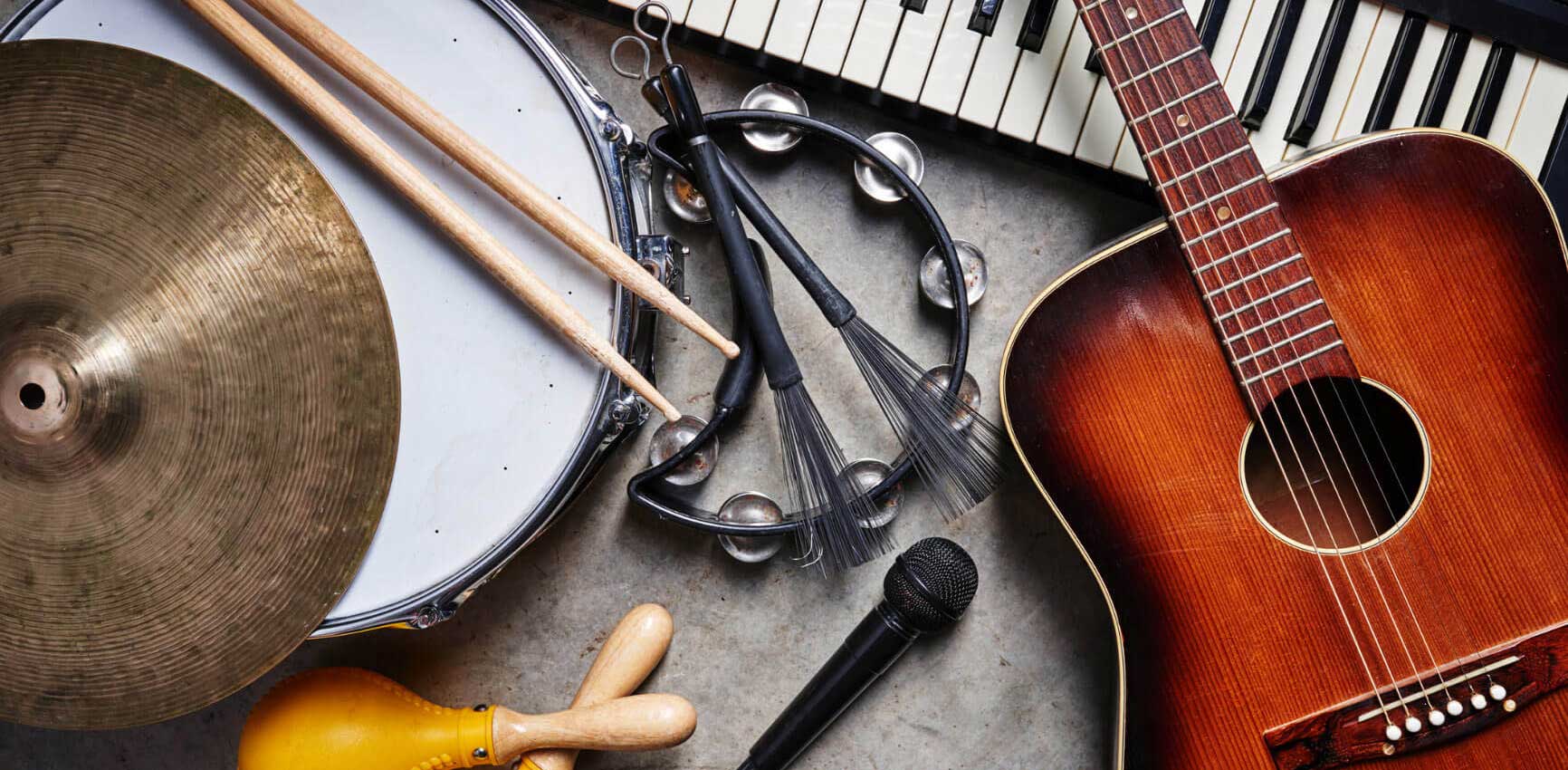
The RIT Music Program owns a variety of instruments for student use. These include all of the standard instruments used in Concert Band, Orchestra, and Jazz Ensemble. Availability of the instruments is based on seniority and need in the ensemble.
Students who receive approval to borrow an instrument owned by the RIT Music Program will be required to sign a form that provides that the borrower is liable for damage to or loss of the instrument. Please contact Michael Dwyer if you would like to check the availability of an instrument owned by the RIT Music Program.
Drum Set Policy: The RIT Music Program owns two drum sets. Only students currently enrolled in an RIT Music Program ensemble are permitted to use these drum sets. RIT is unable to store student-owned drum sets at this time.
Amplifier Policy: The RIT Music Program owns bass and guitar amplifiers. Only students currently enrolled in an RIT Music Program ensemble are permitted to use these amplifiers. RIT is unable to store student-owned amplifiers at this time.
Instrument Storage Policy: There are several instrument storage cabinets in the A130 Music Room. Availability of storage for a personal instrument is based on a first-come, first-served basis with preference being given to students enrolled in the RIT Music Program ensembles. Storage for personal drum sets or other large percussion instruments is not available. Please contact Michael Dwyer if you would like to check the availability of an RIT Music Program instrument storage cabinet.




